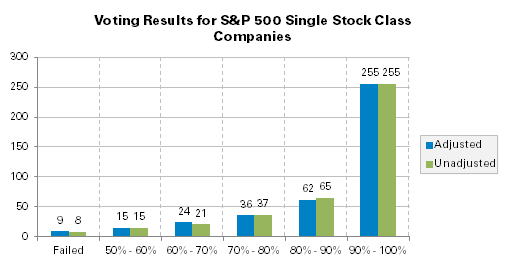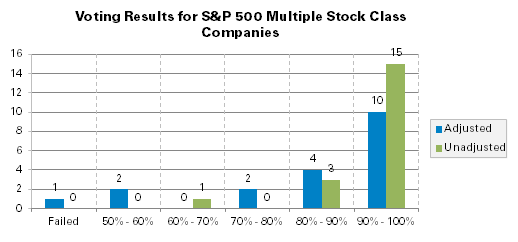|
For a printable copy of the report below, click here. See also the subsequent, related report: |
Equilar, March 15, 2012 report
Outsider Voting AnalyticsA Different View of Say on Pay Voting Results in the S&P 500Introduction
Say on Pay is entering its second year, with much anticipation about what lessons were learned in 2011. Much has been written about the first year's Say on Pay voting results, in which the majority of companies received overwhelming approval for their executive compensation. With the 2012 proxy season fast approaching, Equilar has analyzed last year's voting results focusing on: "How would Say on Pay results look if insider shareholders were excluded from the vote?"
Key Findings for 2011
Methodology
This new analysis examined 420 S&P 500 companies, and compared the actual shareholder vote results to an adjusted set of results where insider votes were removed. To determine the number of insider votes, Equilar started with the director and executive group ownership totals as disclosed in the beneficial ownership table of the proxy statement, and subtracted from that figure non-voting securities such as options and stock units. The resulting share count most closely approximates the number of shares directors and executives could vote at the annual meeting. Equilar assumed that the director and executive shares would be "For" votes. For the 401 companies with a single class of stock, each share was counted as one vote. For the 19 companies with multiple classes of stock, Equilar examined the voting rights of each class of stock and applied the appropriate multiples to the shares held by insiders. In some cases, multiple classes could mean one class has one vote per share and another class does not vote, while in other cases it could mean one class has one vote per share and another has 10 votes per share.
S&P 500 Voting Results - Single Class of Stock
Equilar analyzed voting results at 401 S&P 500 companies with a single
class of stock that held annual meetings between January 25 and June 27,
2011. Whether using the original or adjusted results, the votes were
strongly in favor of the company's executive pay; more than 75% of
companies passed their Say on Pay votes by more than 90%. Removing insider
shares caused a decline in the average approval percentage, from 88.3% to
87.9%. The following chart shows the distribution of companies with a
single class of stock according to their say-on-pay approval rates.
S&P 500 Voting Results - Multiple Classes of Stock
Equilar performed a separate analysis on companies with multiple classes
of stock, due to those companies' significantly different voting
structure. Companies typically utilize multiple classes of stock to enable
an individual or group to maintain a controlling or strong minority voting
interest in a company, without needing to own an equivalent economic
interest. For example, owning a class of stock with 10 votes per share
could allow an individual with 10% economic ownership to have 60% of the
voting power and therefore control any vote.
Equilar analyzed voting results at 19 S&P 500 companies with multiple
classes of stock that held annual meetings between January 27 and October
21, 2011. In the original July analysis that included insider votes, these
19 companies had a greater percentage of affirmative votes than their
single class counterparts in Say on Pay results, with an average approval
percentage of 93.4% compared to 88.3%, respectively. However, eliminating
insider-voting interests for this group had a much greater effect on the
results, with a drop of 9.3% between the unadjusted average of 93.4% and
the adjusted average of 84.1%. The decline would have been even greater if
the analysis had excluded the handful of companies in this group with
nearly 100% voting power held by insiders, since those companies did not
receive a single vote "Against," and therefore had no decline after
removing insider votes. The following chart shows the distribution of
companies with multiple classes of stock according to their Say on Pay
approval rates.
In the analysis, three firms saw a reduction in approval percentages greater than 30%, one saw a reduction of 10%, and an additional seven saw reductions between 5% and 10%. The largest declines in this group were: CBS, falling from 96% to 51% approval; Tyson Foods, dropping from 89% to 52% in favor; and News Corp, losing majority support, changing from passing at 65% to failing at 33%.
Conclusion
As the re-examination results show, for most corporations, insider votes do not have a significant impact on the results of Say on Pay. However, in certain cases, particularly with companies that separate economic and voting power through multiple classes of stock, the opinions of outside investors through the voting process can be distorted by the voting power of inside shareholders who have controlling interests in the company.
For the S&P 500, the original voting results suggest a greater approval of executive pay policies among multiple class companies than among single class companies. Upon removing the assumed influence of executives and directors, multiple stock class companies actually saw lower approval rates from outsiders than did those companies with a single class structure. This suggests that companies with significant insider voting power are less beholden to outside influence in designing pay policies, as they are less likely to lose a vote on executive pay.
|

